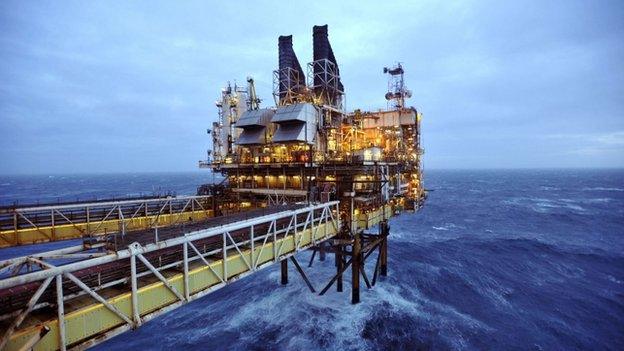When will lower oil prices lead to cheaper energy bills?
- Published

You'd be forgiven for thinking that your household energy bill should be lower soon, given all of the headlines about a dramatic fall in oil prices.
After all, according to Ofgem, nearly half (44%) of UK energy bills are wholesale costs. Network costs make up almost a quarter (23%) and the rest includes environmental/social costs (7%), and VAT (5%). Supplier operating costs are another 13% and there's also a pre-tax margin of 8% for suppliers.
Energy companies say that they buy in advance, so it'll take some time for costs to fall. But when I spoke with Ann Robinson from consumer group USwitch, she didn't agree that it should take a long time for consumers to benefit.
She emphasised the importance of competition in the sector. Small, independent suppliers have raised their market share from a negligible share to about 8%, which she says has helped.
It's the subject of regulator Ofgem's investigation that's been launched with the Competition and Markets Authority (CMA) that will examine the industry. By the end of 2015, they expect to conclude a report about the most appropriate market structure for energy.
Right now, the Big Six energy companies dominate and are more similar to an oligopoly, which is a market consisting of a few big firms and not a lot of competitive ones.
One of the arguments for why scale is necessary is because of investment costs, particularly as some of these firms are also energy generators. This will be investigated as the CMA will look at the extent of competition in the industry.
There are also other reasons for why the average energy bill, which is likely to be about £1,326 over the next year for households, may not come down dramatically. Notably, green levies could nearly double from the current £115 to £215 by 2030. That's a sizeable chunk of an average bill of around £1,326 per year.
Of course, this is all premised on wholesale energy prices remaining low. It's worth a reminder that the UK now imports almost half of all its energy, up from just 3% a decade ago.
This period also coincided with the dramatic increase in oil prices from $25 per barrel to nearly $150, hit in 2008. It was driven by the rapid growth of the global economy, led by China and other emerging markets that were industrialising and adding middle-class consumers.
It's why average UK energy bills have risen by more than three-quarters over the past decade, significantly outpacing general inflation, which rose by around a quarter.
Amrita Sen of Energy Aspects forecasts that oil prices will remain at current levels, so around $60 to $70 per barrel. But she told me that she expects oil prices to rise back to about $80 per barrel towards the latter half of 2015, as global economic growth regains momentum.
It's a similar prediction that I have heard from other experts, such as Daniel Yergin from IHS.
Most analysts don't think that we will return to the days of $100 per barrel of crude.
In any case, oil prices have halved this year and petrol prices have already fallen - and may even reach £1 per litre next year if oil prices remain low.
But for household energy bills, it's just not that straightforward.